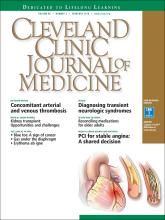Article Figures & Data
Tables
Class Examples Antihistamines Diphenhydramine, hydroxyzine, meclizine Antiparkinsonian agents Benztropine Skeletal muscle relaxants Cyclobenzaprine, methocarbamol Antidepressants Amitriptyline, imipramine, nortriptyline, paroxetine Antipsychotics Olanzapine Antiarrhythmics Disopyramide Antimuscarinics (for urinary incontinence) Oxybutynin, tolterodine, trospium Antiemetics Prochlorperazine, promethazine Antispasmodics Hyoscyamine, scopolamine Drug class (example) Recommendation Rationale Quality of evidence Strength of recommendation First-generation antihistamines (diphenhydramine) Avoid Highly anticholinergic Moderate Strong Antiparkinsonian agents (benztropine) Avoid Not recommended for prevention of extrapyramidal symptoms with antipsychotics; more-effective agents available for treatment of Parkinson disease Moderate Strong Antispasmodics (hyoscyamine) Avoid Highly anticholinergic Moderate Strong Antidepressants (amitriptyline) Avoid Highly anticholinergic High Strong Antipsychotics (conventional or atypical) Avoid except for schizophrenia, bipolar disorder, or short-term use as antiemetic during chemotherapy Increased risk of stroke and death in persons with dementia Moderate Strong Skeletal muscle relaxants (methocarbamol) Avoid Most muscle relaxants are poorly tolerated by older adults Moderate Strong Benzodiazepine (lorazepam) Avoid All benzodiazepines increase risk of cognitive impairment, delirium, falls, fractures, and motor vehicle crashes in older adults Moderate Strong Nonbenzodiazepine and benzodiazepine hypnotics (zolpidem) Avoid Adverse events similar to those of benzodiazepines in older adults Moderate Strong Proton pump inhibitors Avoid using for > 8 weeks unless for high-risk patients Risk of Clostridium difficile infection, bone loss, and fractures High Strong Based on information in reference 58.
- TABLE 3
The Screening Tool of Older Persons’ Potentially Inappropriate Prescriptions (STOPP): Selected warnings and recommendations
Tricyclic antidepressants Avoid use with dementia, narrow-angle glaucoma, cardiac conduction abnormality, prostatism, or history of urinary retention because of risk of worsening these conditions Benzodiazepines No indication for treatment beyond 4 weeks Risk of prolonged sedation, confusion, impaired balance, falls, traffic accidents Withdraw gradually if taken for > 2 weeks because of risk of withdrawal syndrome Proton pump inhibitors For uncomplicated peptic ulcer disease or erosive peptic esophagitis, discontinue full therapeutic dosage before 8 weeks, or reduce dosage Hypnotic “z” drugs (eg, zopiclone, zolpidem, zaleplon) May cause protracted daytime sedation, ataxia Antimuscarinic drugs For overactive bladder with concurrent dementia or chronic cognitive impairment, there is risk of increased confusion, agitation For narrow-angle glaucoma, there is risk of acute exacerbation of glaucoma For chronic prostatism, there is risk of urinary retention Based on information in references 60 and 61.






